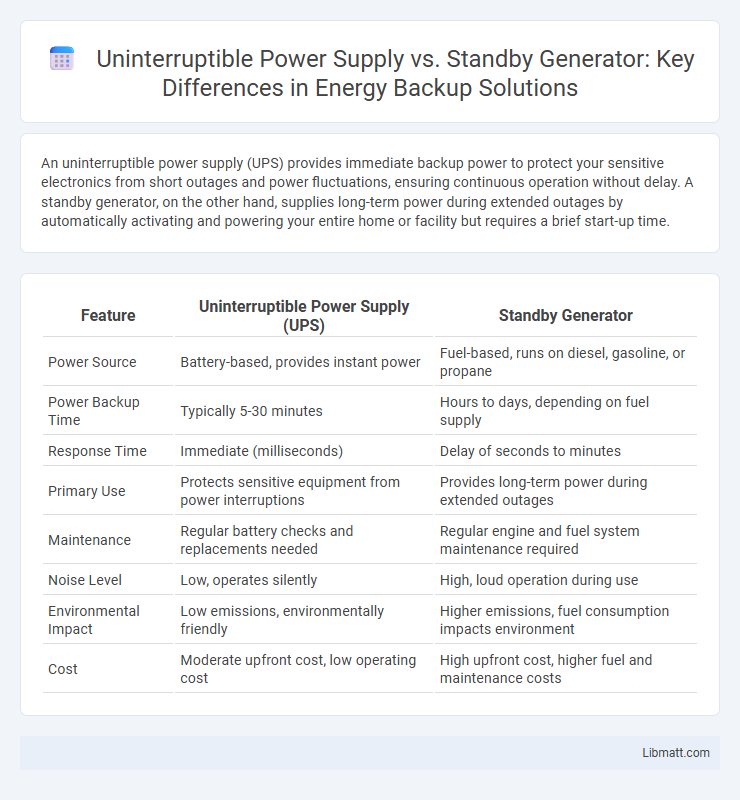An uninterruptible power supply (UPS) provides immediate backup power to protect your sensitive electronics from short outages and power fluctuations, ensuring continuous operation without delay. A standby generator, on the other hand, supplies long-term power during extended outages by automatically activating and powering your entire home or facility but requires a brief start-up time.
Table of Comparison
| Feature | Uninterruptible Power Supply (UPS) | Standby Generator |
|---|---|---|
| Power Source | Battery-based, provides instant power | Fuel-based, runs on diesel, gasoline, or propane |
| Power Backup Time | Typically 5-30 minutes | Hours to days, depending on fuel supply |
| Response Time | Immediate (milliseconds) | Delay of seconds to minutes |
| Primary Use | Protects sensitive equipment from power interruptions | Provides long-term power during extended outages |
| Maintenance | Regular battery checks and replacements needed | Regular engine and fuel system maintenance required |
| Noise Level | Low, operates silently | High, loud operation during use |
| Environmental Impact | Low emissions, environmentally friendly | Higher emissions, fuel consumption impacts environment |
| Cost | Moderate upfront cost, low operating cost | High upfront cost, higher fuel and maintenance costs |
Introduction to Uninterruptible Power Supply and Standby Generator
Uninterruptible Power Supply (UPS) systems provide immediate backup power through battery banks, ensuring continuous power during short outages or fluctuations without interruption to connected devices. Standby generators, powered by fuel sources such as diesel or natural gas, activate automatically during extended power failures, supplying electricity for longer durations. Both systems play critical roles in power continuity, with UPS prioritizing instant switchover and sensitive equipment protection, while standby generators deliver sustained power for extended outages.
How Uninterruptible Power Supplies Work
Uninterruptible Power Supplies (UPS) provide instant power backup by using batteries to deliver electrical energy the moment the main power fails, ensuring zero interruption to your devices. They convert stored DC power to AC power through an inverter, maintaining stable voltage and protecting sensitive equipment from power surges and outages. Unlike standby generators that take time to start, UPS systems engage immediately, safeguarding your critical systems from any downtime.
How Standby Generators Operate
Standby generators operate by automatically detecting power outages and quickly starting to provide electricity within seconds, ensuring continuous power supply. These generators run on fuels such as natural gas or diesel, offering long-duration backup for entire homes or businesses. Unlike uninterruptible power supplies (UPS), standby generators can power larger systems for extended periods but require a brief startup time to activate.
Key Differences Between UPS and Standby Generators
Uninterruptible power supplies (UPS) provide immediate, short-term backup power using batteries to protect sensitive electronics from power interruptions and voltage fluctuations. Standby generators offer long-term power solutions by automatically starting during extended outages, fueled by diesel, natural gas, or propane for prolonged energy provision. Your choice depends on the necessity for instant power continuity versus extended backup duration during outages.
Advantages of Uninterruptible Power Supply
Uninterruptible Power Supply (UPS) systems provide instantaneous power backup, ensuring zero downtime for sensitive electronics during outages, unlike standby generators which require a startup delay. UPS units deliver clean, stable voltage that protects devices from power surges and fluctuations, enhancing hardware longevity and reliability. Their compact size and silent operation make UPS systems ideal for critical environments such as data centers and medical facilities where uninterrupted power is crucial.
Benefits of Using Standby Generators
Standby generators provide continuous power during extended outages by automatically detecting utility failures and activating within seconds, ensuring uninterrupted operation for homes and businesses. They support high-capacity electrical loads, including HVAC systems, medical equipment, and industrial machinery, reducing downtime and potential revenue loss. Their reliability and ability to run on natural gas or propane offer a long-term power solution with minimal maintenance compared to uninterruptible power supplies (UPS).
Applications: When to Use UPS or Standby Generator
Uninterruptible Power Supply (UPS) systems are ideal for providing immediate, short-term power backup to sensitive electronics and critical IT infrastructure during brief outages, ensuring no disruption or data loss. Standby generators are better suited for extended power failures, offering reliable long-term power for whole buildings, medical facilities, or industrial operations where continuous electricity is mandatory. You should choose a UPS for instant protection and smooth transitions, while standby generators serve best when sustained power supply is essential.
Cost Comparison: UPS vs Standby Generator
Uninterruptible Power Supply (UPS) systems typically have lower upfront costs compared to standby generators, making them more cost-effective for short-term power backup in small to medium-sized applications. Standby generators involve higher initial installation expenses and ongoing fuel costs but provide longer-duration power solutions ideal for extended outages. Maintenance costs for UPS units are generally less frequent and less expensive, while standby generators require regular fuel, oil changes, and system checks, impacting overall cost-efficiency.
Reliability and Maintenance Considerations
Uninterruptible power supplies (UPS) provide instant power backup with minimal maintenance, ensuring high reliability for sensitive electronics by preventing even brief outages. Standby generators require regular maintenance, including fuel checks and engine servicing, to maintain reliability during extended power failures. Your choice depends on whether you need immediate seamless power (UPS) or long-duration backup with periodic upkeep (standby generator).
Choosing the Right Backup Power Solution
Selecting the right backup power solution depends on the specific needs of your home or business, with an uninterruptible power supply (UPS) providing instant power during short outages and protecting sensitive electronics from voltage fluctuations. Standby generators offer extended power coverage for longer outages by automatically switching on and running on fuel, making them ideal for critical infrastructure and whole-building backup. Evaluating factors such as outage duration, power load, installation costs, and maintenance requirements ensures a tailored choice between a UPS system and a standby generator.
Uninterruptible power supply vs Standby generator Infographic

 libmatt.com
libmatt.com